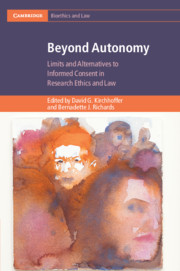Book contents
- Beyond Autonomy
- Cambridge Bioethics and Law
- Beyond Autonomy
- Copyright page
- Contents
- Tables
- Contributors
- Acknowledgements
- Introduction
- Part I Exploring Problems of Respect for Autonomy in Bioethics, Law and Society
- 1 Autonomy and the Law
- 2 Lack of Autonomy
- 3 Diminished Autonomy
- 4 Compromised Autonomy
- Part II The Search for Alternative or Complementary Concepts Surrounding Autonomy
- Part III Beyond Autonomy: Turning to the Community to Protect the Individual
- Index
- Books in the Series
3 - Diminished Autonomy
Consent and Chronic Addiction
from Part I - Exploring Problems of Respect for Autonomy in Bioethics, Law and Society
Published online by Cambridge University Press: 20 September 2019
- Beyond Autonomy
- Cambridge Bioethics and Law
- Beyond Autonomy
- Copyright page
- Contents
- Tables
- Contributors
- Acknowledgements
- Introduction
- Part I Exploring Problems of Respect for Autonomy in Bioethics, Law and Society
- 1 Autonomy and the Law
- 2 Lack of Autonomy
- 3 Diminished Autonomy
- 4 Compromised Autonomy
- Part II The Search for Alternative or Complementary Concepts Surrounding Autonomy
- Part III Beyond Autonomy: Turning to the Community to Protect the Individual
- Index
- Books in the Series
Summary
Autonomous individuals are able to make decisions and effectively implement them, but heroin addiction can compromise this capacity.1 Very severely heroin-addicted persons are disabled in their efforts to implement decisions that would effectively promote their plans and values. For the purposes of this chapter, three salient pathways are available for a person in the grip of severe addiction. First, they may remain in their current situation, continuing to score and consume heroin untreated. Second, they may enter on a course of a maintenance dose of opiates. Or third, they may refuse to give up heroin, thereby triggering a legally mandated treatment regime involving detention in a facility where they receive clinical and transitional support services.2 In the second option, most typically a heroin substitute – either methadone or buprenorphine – is taken, but in some severe cases (about 5 per cent according to Alex Wodak), affected persons are resistant to this approach and in some jurisdictions heroin itself (diamorphine) is given.3 This is known as heroin-assisted treatment, or HAT.4
- Type
- Chapter
- Information
- Beyond AutonomyLimits and Alternatives to Informed Consent in Research Ethics and Law, pp. 48 - 62Publisher: Cambridge University PressPrint publication year: 2019

